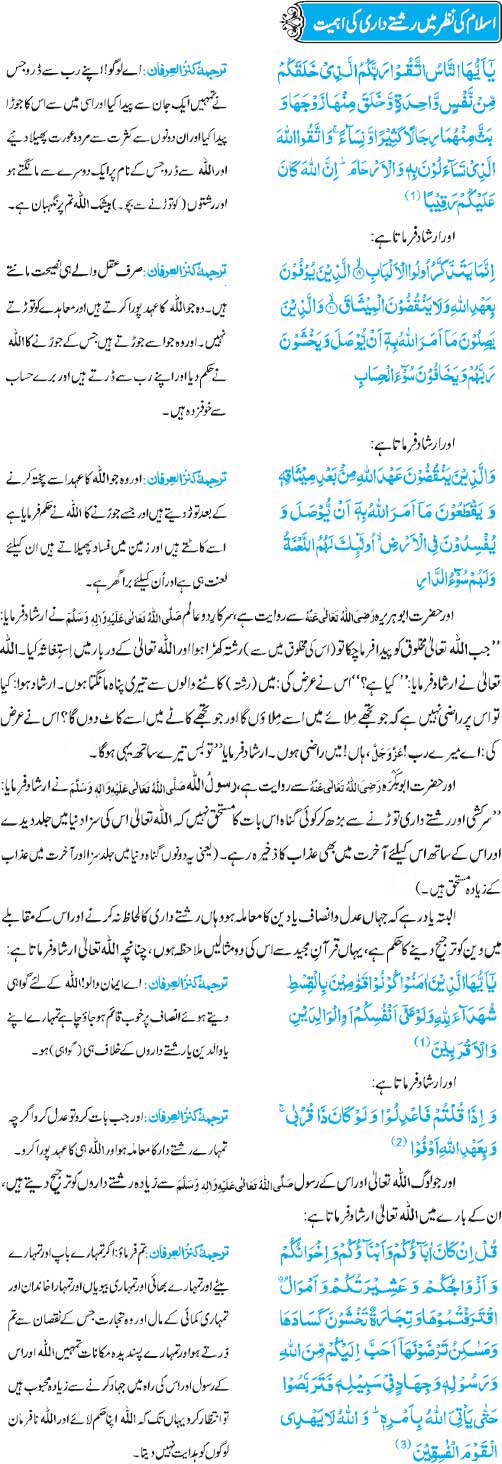
Some Issues Regarding Ghusl
Q. Which Baths are Sunnah, and what are their names?
A. These are four, namely:
- Bath for Friday prayers.
- Bath for the prayers of the two ‘Eids’.
- Bath before wearing ‘IHRAM’ (cloth especially worn by the Hajj pilgrims).
- Bath at ARAFAT for the stay there (Waquf).
- At the time of conversion to Islam
- Washing a dead body
Q. Which, and how many Baths are ‘Desirable’ (Mustahab)?
A. These are quite many. However, a few of them are:
- Bath on the night of the 15th of the month of Sha’ban (known as Shab-e-Bar’at).
- Bath on the night of ‘Arafa’ i.e. the night following the evening of the 8th of Zil-Hiijah.
- Bath for the prayer of the Solar and Lunar Eclipse.
- Bath for the prayer of Istisqa (Salat-ul-Istisqa), which is a prayer for begging rains from Allah.
- Bath before entering the holy cities of Makkah and Madinah.
- Bath of a person who has given a bath to the dead, and
- Bath of a disbeliever, after embracing Islam.
Q. If there is the necessity for a Bath (Ghusl), and one stands in rain; or dives into the river, water flowing all over the body, would that fulfill the conditions of having a Bath?
A. Yes, provided that one also rinses the mouth, and passes water into the nostrils.
Q. Is it permissible to face the Qiblah while bathing?
A. It is not allowed to face the Qiblah when one is naked. There is no harm, however, if the ‘Satr’ is covered. (Satr means such parts of one’s body which must remain covered, according to Shariah).
Q. How is it to bathe with the Satr, uncovered?
A. it is permissible to bathe naked in the bathroom, or at any other secluded place, where one’s Satr is not exposed.
Q. What are the undesirable acts (Makruhat) in a Bath?
A. These are:
- Consuming a lot of water i.e. unnecessary wastage.
- Talking during Bath with the Satr uncovered.
- Facing the Qiblah and;
- Bathing against Sunnah of the Holy Prophet (Peace be upon him).
Q. If ablution (Wudu) is not performed before the Bath, is it necessary to do so for prayer, after taking the Bath?
A. Bath covers ablution, as well. Therefore, no ablution is necessary after the bath.
Visible uncleanliness NAJAASAT HAQIQIY-YAH:
Q. How many kinds of gross defilement [Najaasat Haqiqiya-yah (Visible dirt)] are there?
A. There are two kinds of gross defilement (Najaasat Haqiqiyyah): One is Najaasat-a-Ghaleeza and the other, Najaasat-a-Khafeefa
Q. What are: Najaasat-a-Ghaleeza, and Najaasat-a-Khafeefa?
A. (a) Gross defilements are called Najaasat Ghaleeza; (b) Light uncleanliness is called Najaasat-a-Khafeefa.
Q. How many things fall under the category of gross defilement (Najaasat-a-Ghaleeza)?
A. Urine feces of humans, excretion of animals, urine of forbidden (Haram) animals, the flowing blood of man and animals, and wine and droppings of chicken and ducks, fall under the category of gross defilement (Najaasat-a-Ghaleeza).
Q. What things fall under the category of Light Uncleanliness (Najaasat-a-Khafeefa)?
A. Urine of permissible (Halal) animals and the droppings of forbidden (Haram) birds are all Light Uncleanliness (Najaasat-a-Khafeefa).
Q. To what extent gross defilement (Najaasat-a-Ghaleeza) is excusable?
A. If the gross defilement is thick like excrement, its maximum extent of three grams is excusable. If it is in liquid forms, such as wine, or urine, then it is excusable if the area covered is not more than that of an English one-rupee coin. To be excusable it means that the prayers offered with such defilements on the body or the clothes will be valid, though undesirable. Not removing, deliberately, even such an extent of defilement, is not allowed.
Q. How much light defilement (Najusat a-Khafeefa) is excusable?
A. It is excusable when it covers less than a quarter of a garment or less than one-fourth of any particular part of the body.
Q. How to clean the body or a garment from gross defilement (Najaasat-a-Haqiqiyyah)?
A. Gross defilement (Najaasat-a-Haqiqiyyah), whether it be gross defilement (Najaasat–a-Ghaliza) or (Najaasat-a-Khafeefa) i.e. light uncleanliness on the body, or a garment, can be removed by washing three times. The clothes must also be squeezed, all three times.
Q. Can defilement be cleaned just by the water, or also by something else?
A. Yes, by all thin fluids such as Vinegar; or watermelon juice. These are good enough to wash gross defilement (Najaasat-a-Haqiqiyyah)
Tahajjud, Ishraq, Chasht Aur Awabeen Ki Namaz
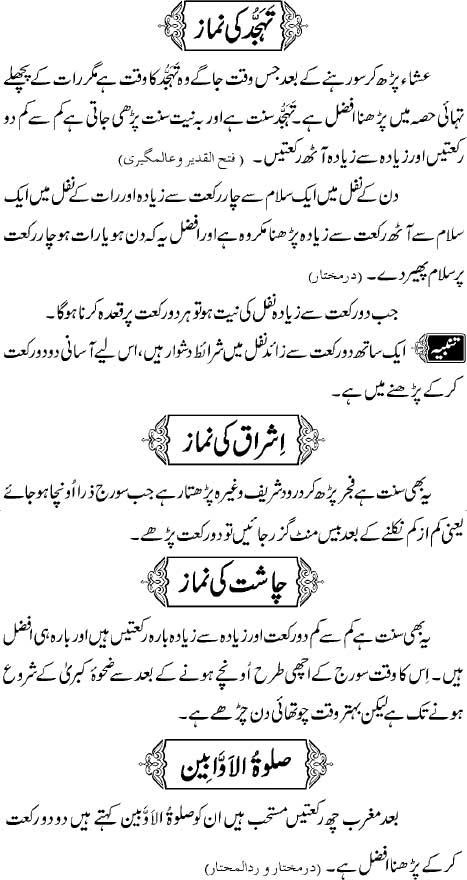
The Bath (Ghusl)
The major Uncleanliness (Najaasat-eHukmiyaah i.e. Hadas-e-Akbar and Janabat) can only be removed from the body by washing the entire body (bath) as known as (ghusl).
Three kinds of ghusl:
- Obligatory (Fard)
- Sunnah
- Desirable (Mustahab)
Fard Ghusl (Ghusl has to be done in these circumstances):
- Discharge of semen in any circumstances
- Sexual intercourse
- Menses (Hajdh)
- Blood discharge after childbirth (Nifaas)
In-state of janaabat the following actions are prohibited
- Salaat (Prayers of any type)
- Touching the Holy Quran
- Reciting the Holy Quran
- To enter a Masjid (mosque)
- To make Tawaaf of Ka’bah
Method Of Ghusl:
- Wash hands up to the wrists.
- Clean the private parts also known as Istinja and remove the major Uncleanliness, if any, from the body.
Perform Ablution (Wudu). - Pour some water and rub the whole body. Pour water again over the whole body, three times. Then rinse the mouth and sniff water into the nostrils.
Faraid Of Ghusl:
- Rinsing the mouth.
- Sniffing water into the nostrils.
- Pouring water over the whole body so no single part of the body remained dry including hairs.
Sunnan Of Ghusl:
- Washing both hands up to the wrists.
- Washing the private parts and such areas which are not clean.
- Having the intention (Niyah) to remove the uncleanliness.
- Pouring the water thrice, on the whole body.
Dua Mein Khushu Aur Khudhu

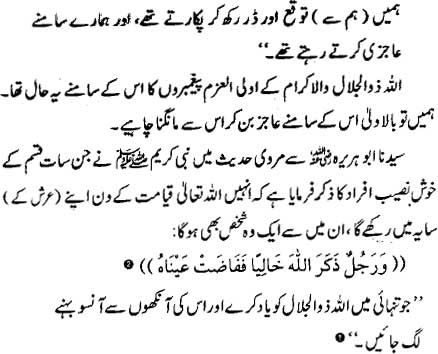
Rules About ‘Invalidators’ Of Ablution
Q. What quantity of an unclean discharge from the body invalidates the ablution?
A. If any small quantity of an unclean fluid, (blood/pus) discharges from the body and flows towards that part of the body whose washing is essential in bath or ablution, will breach the ablution.
Q. Does any blood which remains within the eye, invalidate the ablution?
A. No. It is because washing the inner portion of the eye is not commanded in ablution, or in the bath.
Q. If blood trickles out of a wound, time and again, and is wiped off each time with a finger or a piece of cloth, would that invalidate the ablution?
A. It must be judged whether the blood would have flowed, had it not been wiped. If it would have flowed, then the ablution breaks; otherwise, it remains intact
Q. What things, when vomited, nullify the ablution?
A. If a mouthful of bile; blood; food, or water is thrown out, the ablution is breached. If only phlegm is thrown out, the ablution is not invalidated.
Q. What, if one vomits again and again but in little quantity each time?
A. The ablution is breached if one nausea causes several vomits whose total discharge equals a mouthful. However, suppose nausea results in vomiting a small quantity which brings relief, and thereafter one nauseates a second time to vomit a small quantity again. In that case, the discharge of these two separate episodes will not be added (to see they equal a mouthful), and the ablution will remain intact.
Q. If blood or pus, oozing out of a boil on any part of the body, stains the clothing, will that dress be considered clean, or unclean?
A. If the blood or pus is so little that it cannot flow from the wound, the clothing will be considered as clean. However, it is better to wash it.
Q. Is the vomit, which is less than a mouthful, unclean (Napak)?
A. No. It is not.
Q. Will ablution be invalidated if a leech clings to one’s body, and sucks blood to its fill; or, a bug or a mosquito bites a person?
A. The sucking of blood by a leech will breach the ablution even if no blood flows from the wound after freeing the body from it. The blood would have certainly oozed down the body had it not been sucked by the leech. Ablution, however, will be valid in the case of a mosquito, or a bug bite, because blood sucked by these insects is quite small, and cannot flow.
Q. What type of sleep does not invalidate the ablution?
A. Sleeping in a standing position, or while sitting without any support, or in any posture adopted in the prayer, such as Sijdah, or a Qa’dah, does not break the ablution.
Q. Is such a person whose ablution does not break even by falling asleep?
A. Yes, ablution of the prophets of Allah does not break even if they fall asleep. This was their special privilege and superiority.
Q. Does bursting into laughter during prayers, break the ablution of all? If so what is meant by ‘bursting into laughter?
A. Bursting into laughter means: Laughing in such a loud way that it is heard by the others who are nearby.
The following are the conditions that invalidate ablution during the prayer:
- The person laughing aloud is an adult man or a woman. (Minor’s laughter does not break the ablution).
- The person who laughs must be awake. If a person falls asleep during prayer and then bursts into laughter, his ablution will remain intact.
- If one laughs in prayer requires bowing (Ruku), or prostration (Sujud). Thus, if one laughs in a funeral prayer, the ablution would not break.
Q. Is ablution nullified if one sees the private part/s of any other person’s body, that must remain hidden (Satr)?
A. No. The ablution remains valid, if one looks at the private part/s of one’s oven, or another person’s body, intentionally or unintentionally.
Syed Ul Mursaleen (PBUH) Ka Sabar
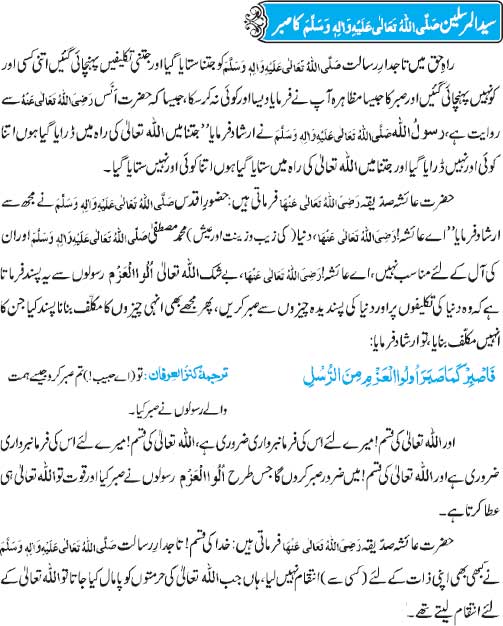
Rules: Sunnah In Ablution(Wudu)
Q. How is it to perform ablution (Wudu) without its intention?
A. If without the intention of ablution, one falls in the river, or one keeps standing in the rain so that water passes over all the parts which are necessary for the ablution, it will be considered that the ablution is done for saying prayers. But there will be no blessings for the ablution.
Q. How to make intention (Niyyah) for ablution (Wudu)?
A. Intention implies the making-up of one’s mind at the start of ablution; having the intention of removing impurity, and becoming clean for saying the prayers properly. Such thoughts mean ‘intention’ i.e. ‘Niyyah’ for the ablution.
Q. Is it necessary to express the intention (Niyyah) in words?
A. No, it is not necessary. However, if said in words, that too will be correct.
Q. With ablution intact, if fresh ablution is performed, what should be the ‘intention’ (Niyyah) for that?
A. The sole intention of performing ablution-over-ablution should be to enhance the blessings of Allah and to earn more benefits.
Q. Must one say the complete Tasmiah in ablution?
A. It is equally permissible to recite:
BISMIL LAHIR RAHMAN NIR RAHIM (or)
BISMIL LAHIL ‘ALIYIL ‘AZIM VAL HAMDU LIL LAHI ‘ALA DINIL ISLAM (or)
BISMIL LAHI WAL HAMDU LIL LAHI i.e., in any of the above three ways
Q. How is it to use a tooth-stick (Miswak) and what is its method?
A. Brushing the teeth with a tooth-stick (Miswak) is ‘Sunnah Mu’akkadah’ i.e. Emphasized Sunnah. It has many blessings and very many benefits. It may be had from the root of a bitter tree, or its twig e.g., Peelo’s root, or a stick from the Neem tree, not more than 8 inches in length. It should be rinsed before and after use. First brush the teeth from the right side, followed by those on the left. The teeth should be brushed thrice, using fresh water each time.
Q. What is the opinion about gargling?
A. Gargling is an act of Sunnah, both during bath and ablution It should not be done if one is Fasting. During Fasting, only rinse the mouth with a handful of water using the right hand.
Q. How to put water into the nostrils?
A. Hold water in the scooped right hand close to the nose. After this, sniff water into the nostrils (taking care not to let it reach the brain). If one is Fasting, the water should not be sniffed. Instead, it should be put into the nostrils with the hand. Gargling and sniffing water into the nostrils are both Sunnah-mu’akkadah of the Holy Prophet (Peace be upon him).
Q. Which part of the beard should be combed (to do Khalal) according to the Sunnah?
A. It is Sunnah to comb (to do Khalal with fingers) the lower and middle (part) of the beard. And it is obligatory (Fard) to wash hair on the face adjoining the skin.
Q. How to comb the fingers i.e., to do Khalal of the fingers?
A. Khalal of the fingers means that the fingers of both hands should be rubbed against each other and shaken in a manner that they are interwoven. The Khalal of the toe is done by the little finger of the left hand beginning from the little toe of the right foot and ending with the little toe of the left foot.
Q. How to perform the Massah of the whole head?
A. Wet both hands, and place them on both sides of the hair at the forehead. Move both palms and fingers, to the back of the head, up to the nape. Then return hands, ensuring that the whole head is covered.
Q. Must fresh water be used for the Massah of the ears?
A. No, the water taken for the Massah of the head would do. use index finger for Massah inside the ears. The thumb should be used for the outside of the ear.
Q. Is it Sunnah or Mustahab (desirable) to start the ablution from the right side?
A. Some religious scholars hold it as Sunnah, while others regard it as desirable (Mustahab).
Q. How to perform Massah on the back of the neck (nape)?
A.The neck should be wiped with the back of fingers of both the hands. It is an innovation (Bi’dah) to do Massah on the throat.
Q. What are the other procedures in ablution?
A. There are many procedures for ablution. For example, the following are desirable:
- Putting the wet tip of the small finger into the ear holes.
- Performing ablution before the time of prayer.
- Rubbing parts of the body while washing them.
- Moving the ring on the finger.
- Refraining from gossiping about worldly affairs.
- Avoid splashing water on the face (with force).
- Not using too much water for ablution.
- Reciting Tasmiah while washing each part of the body.
- Sending Darud on the Holy Prophet (Peace be upon him) after ablution.
- Reciting Kalima of Shahadah, and reciting the following Dua after ablution:
ALLA HUMMAJ ‘ALNI MINAT-TAW-WABINA WAJ ‘ALNI MINAL MUTATAHIRIN - Drinking the left-over water of ablution while standing.
- Offering two Rakahs of prayer after ablution, known as TAHI YAT UL WUDU (Thanksgiving for the ablution), etc.
Jin Halatoon, Jaghoon Aur waqtoon Mein Azkar Mamnu Hein
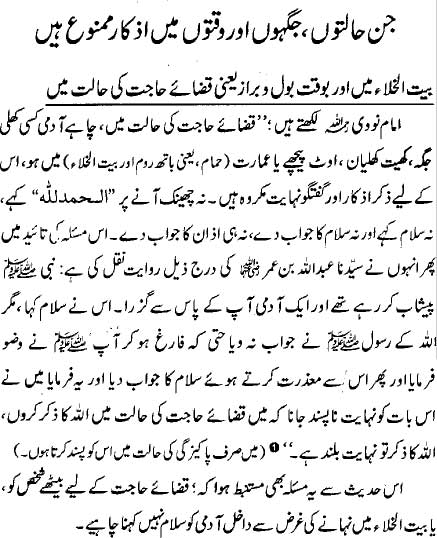
Compulsory Actions For Ablution
Q. How is it to say the prayer, without ablution?
A. It is a big sin. Some religious scholars hold the person Kafir, who intentionally offers the prayer, without ablution.
Q. What is the proof of ablution being a necessity for saying the prayer?
A. The following verse of the Holy Qur’an stipulates that ablution is an essential pre-requisite for prayer.
(O Believers when you rise up for prayer, wash your face, and your hands up to the elbows. And lightly rub your heads. And wash your feet up to the ankles).
And Hadrat Muhammad (Peace be upon him) has said: MIFTAHUS SALATIT TUHUR (Cleanliness is the key to prayer)
Q. What is the minimum that may be called washing?
A. To pour water on a limb, sufficient enough to wet it, permitting one or two drops to fall down. This is washing in its lowest term Wetting to a lesser degree, is not ‘washing’. For example, if one moves wet hands over the face, using so little water that all of it is absorbed and no drops fall down, it will not be considered that one has ‘washed’ the face. Ablution (Wudu) therefore, will not be complete.
Q. How many times, parts be washed, and whose washing is obligatory for ablution?
A. Washing them once, is obligatory (Fard) Washing them up to three times, is the Sunnah of the Holy Prophet (Peace be upon him). And to wash more than three times is undesirable (Makruh) and not permissible.
Q. What portion of the face must be washed?
A. The face must be washed from the hair of the forehead to down under the chin, and from the tip of one ear to the tip of the second ear.
Q. Is ablution valid if a small area of the limb, washing of which is obligatory, is left dry?
A. Even if a tiny spot, as small as one hair, is left dry, the ablution will not be valid.
Q. If one has six fingers, is it obligatory to wash also the sixth finger?
A. Yes. It is obligatory to wash the sixth finger also. Similarly, any additional growth within a part of a limb, whose washing is obligatory, must also be washed.
Q. What is the meaning of performing Massah?
A. To move wet hands over a part of the body is known as Massah
Q. Must a person wet the hands afresh, for performing Massah of the head, or would the moisture still left on them (while washing other parts of the body), suffice for the purpose?
A. It is better to take fresh water, but if hands are wet after washing,
Massah is allowed with them. But Massah is not allowed with hands with which Massah has been performed once before. Similarly, Massah is not allowed with hands: a) soaked from some other wet part, b) or hands moistened by another such part on which Massah has already been done.
Q. If there are drops of rain on the bare head, and such water drops are spread by a dry hand all over the head, would that serve the purpose of Massah?
A. Yes, the Massah is performed.
Q. Is it necessary, in ablution, to wash the inside of the eyes?
A. No, it is not necessary to wash the inside of the eyes, the nose, or the mouth.
Q. If after ablution one shaves the head, or cuts fingernails, will it be necessary to do fresh Massah of the head, or wash the fingernails again?
A. No, it is not required to be done.
Q. If one’s hand is amputated (cut) below the elbow, is it necessary to wash that limb (hand)?
A. Yes, as long as the elbow or some other portion below it is intact, it must be washed.

